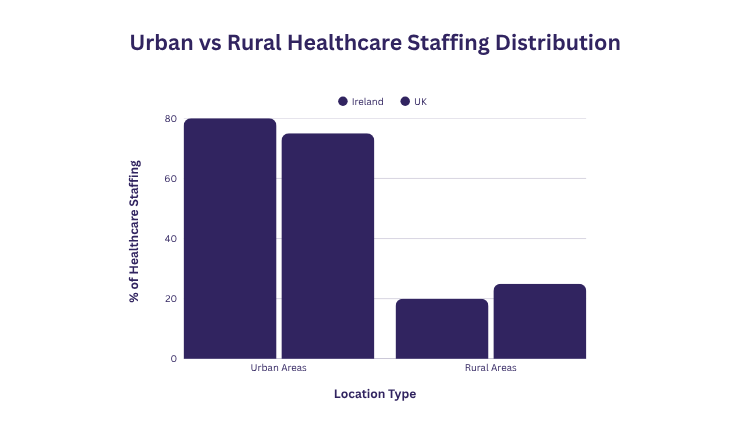Rural healthcare plays a vital role in supporting communities, often acting as the frontline of patient care where access to major hospitals and clinics is limited. In both Ireland and the UK, remote and rural areas face an enduring staffing crisis that is placing significant pressure on services, especially as patient needs grow more complex.
We explore the reasons behind rural staffing challenges, how the issue manifests differently across regions, and the innovative solutions that are helping fill the gaps.
20% of healthcare professionals work in rural regions, despite 30% of the population living outside urban centres.
The Urban-Rural Divide in Healthcare
Despite health services striving for equal care access, the geographic imbalance between urban and rural regions is stark:
- Urban areas attract the majority of healthcare professionals due to proximity to hospitals, infrastructure, and professional development.
- Rural and remote areas struggle to recruit and retain staff, often due to isolation, lack of amenities, fewer training opportunities, and work-life balance concerns.
A 2023 report from the Irish Department of Health highlighted that only 20% of healthcare professionals work in rural regions, despite 30% of the population living outside urban centres. Similarly, NHS data shows rural English counties such as Cornwall, Cumbria, and Lincolnshire face consistent vacancies, particularly in nursing and GP services.

Challenges in Rural Healthcare Staffing
1. Workforce Shortages
Rural areas face higher vacancy rates, with fewer applicants per post. Shortages are particularly acute in roles like:
- General Practitioners
- District Nurses
- Mental Health Nurses
- Midwives
- Allied Health Professionals (e.g. physiotherapists, speech therapists)
2. Ageing Population
Rural populations tend to be older, requiring more complex and frequent care. This increases pressure on already limited resources.
3. Professional Isolation
Clinicians working in rural settings often report feelings of isolation due to the absence of peer support, training, and mentorship that’s more available in hospital or urban settings.
4. Recruitment and Retention Barriers
Factors include:
- Fewer career progression opportunities
- Difficulty accessing continuing professional development (CPD)
- Family relocation challenges (e.g. schooling or employment for spouses)
- Housing shortages or high/elevated costs in popular rural regions
Ireland vs UK: A Shared but Unique Landscape
While both countries face similar problems, there are regional differences in approach:
Region | Key Focus
Ireland (HSE) | Emphasis on Community Healthcare Networks, expanding rural nursing roles
UK (NHS) | Use of the “Golden Hello” and Rural Support Scheme for GPs and trainees
Ireland’s Sláintecare programme aims to shift care closer to the community, making rural services even more essential. Meanwhile, NHS trusts have developed innovative incentives to recruit clinicians into remote roles, including relocation bonuses and flexible contracts.
The Role of Agency Staffing
Healthcare staffing agencies play a crucial part in filling rural healthcare gaps:
Rapid Response to Demand
Agency nurses and locum doctors can be deployed quickly to cover seasonal demand, unexpected absences, or understaffed facilities.
Flexibility for Both Parties
Clinicians benefit from flexible short-term contracts, while hospitals and clinics maintain service delivery without long-term commitment.
Specialised Recruitment
Agencies like PE Global Healthcare maintain databases of qualified professionals specifically open to rural placements, including those who prefer remote locations or are seeking a change of pace.
Cost-Effective Fill-ins
While some argue agency staffing is expensive, the cost of leaving a position vacant, particularly in isolated communities, is often far greater in terms of patient outcomes and burnout among existing staff.
How PE Global Healthcare Supports Rural Staffing
At PE Global Healthcare, we actively work with clients across Ireland and the UK to support rural recruitment by:
- Maintaining a responsive roster of agency nurses, locums, and allied professionals
- Partnering with HSE and NHS trusts to understand regional needs
- Providing candidate relocation support and rural-readiness advice
- Supporting clinicians with flexible, rewarding work that fits their lifestyle
Our specialist recruiters also work closely with professionals considering rural work for the first time, offering insights into community life, local infrastructure, and opportunities for longer-term placement.
Towards a More Equitable Future
Solving rural healthcare staffing requires both systemic reform and short-term support. While digital health and remote consultations offer promise, boots-on-the-ground clinicians will always be essential.
By combining national strategies with flexible staffing solutions, we can help create a healthcare system that delivers high-quality care no matter where a patient lives.
If you’re a healthcare professional considering rural roles or a facility in need of urgent staffing solutions, PE Global Healthcare is here to help. Contact us today or Register with PE Global Healthcare.
